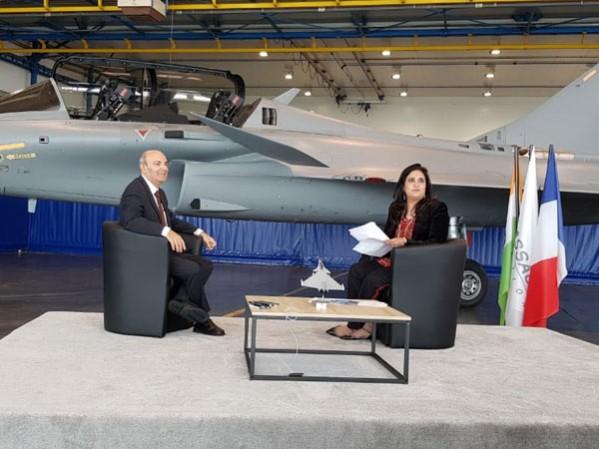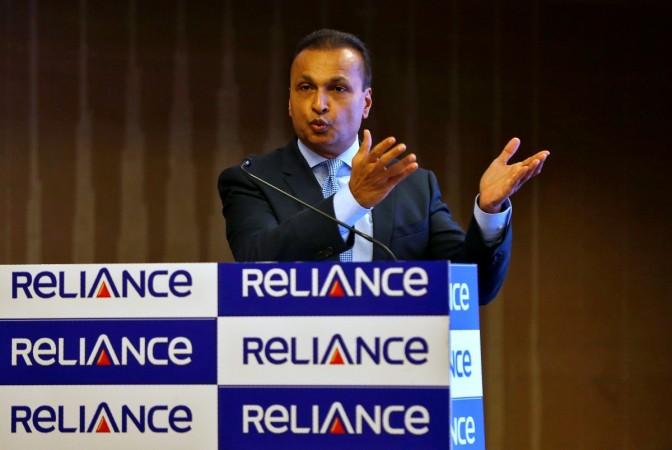
Dassault Aviation Chief Executive Officer (CEO) Eric Trappier has rubbished allegations by Congress president Rahul Gandhi that the former lied about the details of the Dassault-Reliance Joint Venture (JV) for offset contracts in the Rafale jet deal.
"I don't lie. The truth I declared before and the statements I made are true. I don't have a reputation for lying. In my position as CEO, you don't lie," Trappier told ANI in an exclusive interview. He was asked to respond to Rahul Gandhi's charge that Dassault was covering up for possible cronyism in awarding the offset deal to Anil Ambani-led Reliance Group.
In a press conference on November 2, Rahul Gandhi had alleged that Dassault invested Rs 2.84 billion in a loss-making company promoted by Anil Ambani which was used to procure land in Nagpur. "It is clear the Dassault CEO is lying. If an inquiry starts on this Modi is not going to survive it. Guaranteed," Gandhi had said.
Speaking to ANI in the Dassault hangar housed in Istres-Le Tube Airbase located North of the French city of Marseille, Dassault's CEO Eric Trappier said that they had prior experience dealing with the Congress party and the comments made by the Congress president made him sad.
"We have a long experience with the Congress party. Our first deal was with India in 1953 with Nehru and other Prime Ministers. We have been working with India. We are not working for any party. We are supplying strategic products like fighters to the Indian Air Force (IAF) and the Indian government. That is what is most important," said Trappier.
When pressed further for the reason behind Dassault's choice of Reliance as an offset partner which had no experience in manufacturing fighter jets, Trappier clarified that the money being invested was not going to Reliance directly but in a Joint Venture (JV) that included Dassault.
"We are not putting the money in Reliance. The money is going into the JV. I put my know-how free of charge on how to produce people. I have engineers and workers from Dassault who are taking the lead as far as the industrial part of this deal is concerned. At the same time, I have an Indian company like Reliance who is putting money into this JV as they want to develop their country. So, the company is going to know how to produce aircraft," added Trappier.
Trappier clarified further about the investments being made by Dassault, adding that Reliance would match the amount since the shareholding pattern is 49 per cent Dassault and 51 per cent Reliance as per prescribed government norms.
"We are supposed to put in this company together about Rs 8 billion as 50:50. For the time being, to start work in the hangar and to pay workers and employees, we have already put Rs 400 million. But it will be increased to Rs 8 billion, which implies Rs 4 billion by Dassault in the coming five years," said Trappier.
He added Dassault has seven years to perform offset. "During the first three years, we are not obliged to say with who we are working. We have already settled work an agreement with 30 companies, which represents 40 per cent of total offset obligation as per contract. Reliance is 10per cent out of the 40, while rest 30 per cent is a direct agreement between these companies and Dassault," Trappier said.
On the pricing issue, the CEO said that the present aircraft are cheaper by 9 per cent. "Price of 36 was exactly the same when you compare with 18 flyaway. 36 is the double of 18, so as far as I was concerned, it should have been double the price. But because it was government to government, there was some negotiation, I had to decrease the price by 9 per cent. The price of Rafale in flyaway condition is less expensive in the 36 contracts than the 126 contract," he said.
When asked about the initial agreement with Hindustan Aeronautics Limited (HAL) and the subsequent breakdown of talks with the Indian PSU for production of Rafale jets, the Dassault CEO said that if the initial deal of 126 jets went through they would not have hesitated to work with HAL and Mukesh Ambani-led Reliance.
"It's because the 126 didn't go smoothly that the government of India had to reconfigure to urgently acquire 36 from France. And then I took the decision to continue with Reliance, and HAL even said in the last few days that they were not interested to be part of the offset. So, it has been done by my decision and the decision of Reliance to invest in a new private company," added Trappier.
He added that Dassault was earlier in discussions with several other companies for offset tie-ups. "Obviously, we could have gone to Tata or other family groups. At that time, the decision to go ahead was not given to Dassault. We were in 2011, Tata was also discussing with other flying companies. We finally decided to go ahead with Reliance as they have experience in big engineering facilities," Trappier said.
Talking about the aircraft, the Dassault CEO explained that the present planes will have all the necessary equipment but not weapons and missiles. "The weapons will be sent in a different contract. But the aircraft with everything other than weapons will be dispatched by Dassault," he said.
















